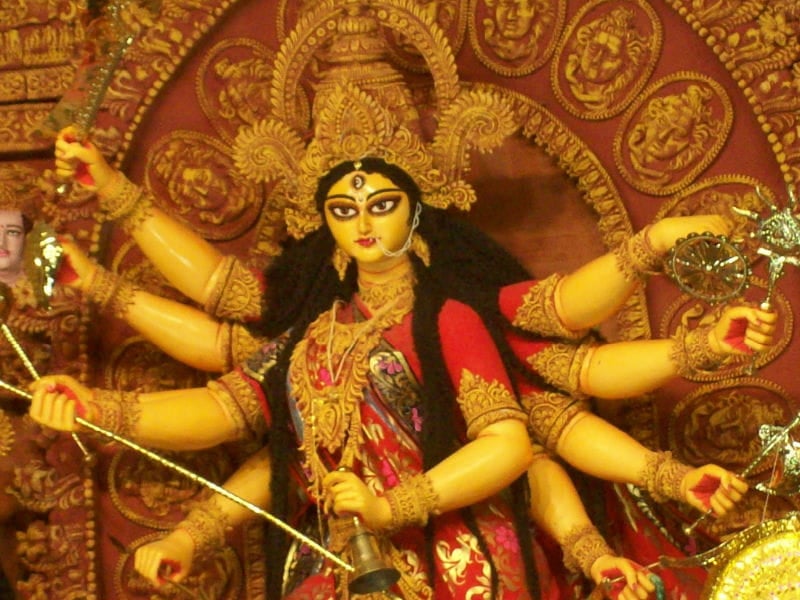Q. Why is it OK to eat plants? Don't they have emotions and feelings of pain like animals?
A. Plants are lower down on the food chain, and although they are sensitive to pain, they are much less sensitive to it or conscious of it than animals. To live in this world one has to cause pain. Therefore we recommend that you learn to transcend material existence even while being present in the material world. With regard to eating, this is accomplished by offering your food to Krsna and partaking of the remnants (prasada).
Bhaktivinoda Thakura surmised that if we take that which we have in common with other species--our primal animalistic necessity of self-preservation--and spiritualize it, humanity can easily realize its potential for love. Prasada, he taught, is the solution to all of our perceived problems. Without prasada, we are left to create havoc in the environment, exploiting others in the name of self-preservation. Prasada means 'kindness, grace.'
If we learn to plant, cultivate, prepare, and offer food to Krsna before taking any ourselves, we will convert out primal animal necessity into spiritual experience and realize the zenith of human potential. The act of offering our food to Krsna brings our primal material necessity of self-preservation in conjunction with our spiritual capacity for love. This has the power to transform our entire life - to uproot our domination over others and replace it with dependence upon God. All of the reactions for our life of domination, our habitual consumption, can be overcome by this practice.
We must grow, collect, prepare, and offer ingredients for the satisfaction of Krsna. This is the first consideration, the substance of the transaction. Secondarily, because our entire life is engaged in his service, he energizes our efforts through his remnants, his kindness and grace--prasada. Not only will no adverse reaction come to us if we conduct our lives in this manner, but we will become true Vaisnavas--agents of goodwill for others.
Q. Why do the scriptures use a symbolic language that can be interpreted in innumerable ways according to the intention of the interpreter?
A. It is not the defect of scripture that it speaks of ultimate reality in poetic and symbolic language. What other language could come close to doing it justice? God is beyond the words of scripture, which while indicating something about him, implore us to reflect upon those words and thereby know and love. The apparent ambiguity of scripture is a testament as to the diversity of the Godhead. The gem of life has many facets.
Q. Do you have to pay the price for sins committed by the mind but not committed in reality?
A. Sins committed in the mind generally lead to sins of the flesh. Therefore, we are advised to control our minds. While contemplating sinful thoughts, you cannot be happy. Thus you do suffer for this kind of contemplation. As for any future ramifications of inappropriate contemplation, Krsna instructs us that our mental preoccupation determines our next birth. So-called 'idle' thoughts are not independent of karma; they are active in the psychic dimensions and lead to karmic reactions. Strive to control your mind. This is central to yoga practice.
 Hindus may submit questions for the swami to editor@swami.org. Non-Hindus with questions on Hindu basics or etiquette (such as "What do I wear to a Hindu wedding?") are invited to submit them to columnists@staff.beliefnet.com.
Hindus may submit questions for the swami to editor@swami.org. Non-Hindus with questions on Hindu basics or etiquette (such as "What do I wear to a Hindu wedding?") are invited to submit them to columnists@staff.beliefnet.com.
A. In order to properly worship the Deity of Krsna, you need to receive the appropriate mantras for such worship from a guru. The process of Deity worship (arcana) is generally reserved for initiated devotees. Given your situation, the best thing you can do for your Deity, yourself and your neighbors is to hold Krsna kirtan in your home. Just sit or stand and sing aloud the Hare Krsna maha mantra. Don't be concerned about the initial reaction of others. Just go on chanting at a regular times throughout the day and expect a miracle.
Q. Why is there such an uneven distribution of spiritual fortune in the world? Why was only India chosen to be the fountainhead of spiritualism where all the great incarnations appeared?
A. Wherever God manifests, that place becomes sanctified and the entire Earth is blessed. It is also said that Bharata (India) was much larger in the past, and many of the Puranic tales describe lands outside of India proper. Thus, the Puranas speak more of a world culture. Try to appreciate God's descent in Bharata from a planetary viewpoint. The word 'India' is not mentioned anywhere in the scripture.
Furthermore, it is quite possible that at the present time God is more present in other parts of the world, as India either turns her back on her spiritual heritage altogether, or misidentifies spirituality with misunderstood Hindu culture, superstition, and religious dogma. Srila Bhaktivedanta Swami Prabhupada expressed this at one point in his campaign. Indeed it is the Western interest in Bharata's spirituality that is spreading it all over the world. Wherever the interest in God is greater, that is where he is most present.
As many of Caitanyadeva's eternal associates did not take birth in Navadwipa Dhama, but rather outside of the Dhama for the sake of distributing love of God all over the world, devotees of Sri Caitanya are taking birth all over the world to continue this effort. In doing so they can appreciate the spirituality of other traditions in the spirit of essence seeking (saragrahi) Vaisnavas.

